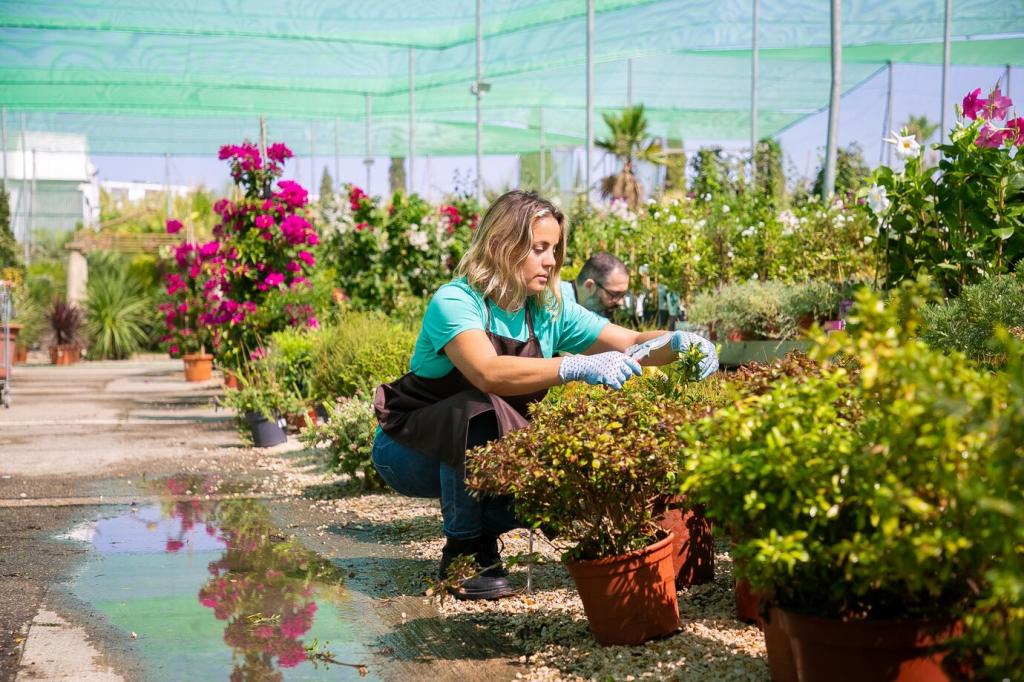
Hydroponics and Aquaponics in Cities
Hydroponics and aquaponics are revolutionary approaches to urban agriculture, transforming the way cities grow food. By integrating these soil-free cultivation techniques into urban environments, city dwellers are finding innovative solutions to food security, sustainability, and the efficient use of space. As populations continue to concentrate in urban areas, harnessing the potential of hydroponics and aquaponics becomes increasingly important for creating resilient food systems and minimizing the environmental impact of food production within cities.

Soilless Cultivation Techniques
Hydroponics and aquaponics rely on nutrient-rich solutions instead of traditional soil to grow plants. In the case of hydroponics, water mixed with minerals directly nourishes the plant’s roots, allowing for precise control over nutrition and leading to faster, more efficient growth cycles. Aquaponics combines hydroponics with aquaculture, using waste from fish to fertilize plants, which in turn purify the water for the fish. This synergy allows for sustainable, closed-loop systems that can flourish indoors, on rooftops, or in unused building spaces across the urban grid.
Space Efficiency in Urban Environments
City environments often struggle with limited available land for traditional farming. Utilizing vertical space—think rooftop gardens, vertical walls, and repurposed warehouses—hydroponics and aquaponics make it possible to grow substantial amounts of food within a fraction of the area necessary for conventional agriculture. These systems can be scaled to fit narrow balconies, abandoned lots, or large commercial spaces, making them attractive options for both hobbyists and professional urban farmers seeking to maximize productivity in dense environments.
Reducing Urban Food Deserts
Many city neighborhoods have limited access to fresh fruits, vegetables, and fish, resulting in so-called food deserts. Hydroponics and aquaponics help bridge this gap by enabling local production of high-quality, nutritious foods close to where people live. By shortening the supply chain, cities can increase food security and ensure that even the most underserved communities benefit from affordable, sustainable, and healthy options, ultimately contributing to public health and community resilience.
Water Conservation Practices
One of the most significant environmental advantages of hydroponics and aquaponics is their remarkable water efficiency. Traditional agriculture can consume vast amounts of water, much of which is lost to evaporation or runoff. In contrast, soilless systems recycle water continuously, using up to 90% less than conventional farming methods. This closed-loop approach is especially beneficial in urban settings where water resources are strained and sustainability is a top priority.
Decreased Carbon Footprint
Transporting food over long distances to reach urban markets contributes substantially to carbon emissions. By growing food directly within city limits through hydroponics and aquaponics, the need for transport is drastically reduced. Additionally, these systems can be powered by renewable energy sources such as solar or wind, further minimizing their carbon footprint. Cities that adopt these technologies not only produce cleaner food but also play a vital role in reducing greenhouse gases and supporting global environmental goals.
Lower Pesticide Usage and Waste Production
Hydroponic and aquaponic farms operate in controlled environments, minimizing the needs for chemical pesticides and herbicides that are typically used in conventional agriculture. As a result, the produce is often cleaner, safer, and more appealing to health-conscious urban consumers. These closed systems also generate less organic waste, as nutrients and water are recycled efficiently, and the risk of soil contamination or leaching is eliminated, contributing to a greener cityscape.
Previous slide
Next slide

As urban farming gains momentum, so too does the demand for skilled workers—ranging from technicians who maintain system hardware to agricultural specialists who oversee crop cycles and educators who train new growers. Hydroponics and aquaponics present a broad spectrum of employment opportunities, supporting not only farm operators, but also businesses supplying equipment and services. The rise of these industries in cities encourages economic diversification and strengthens local economies.
